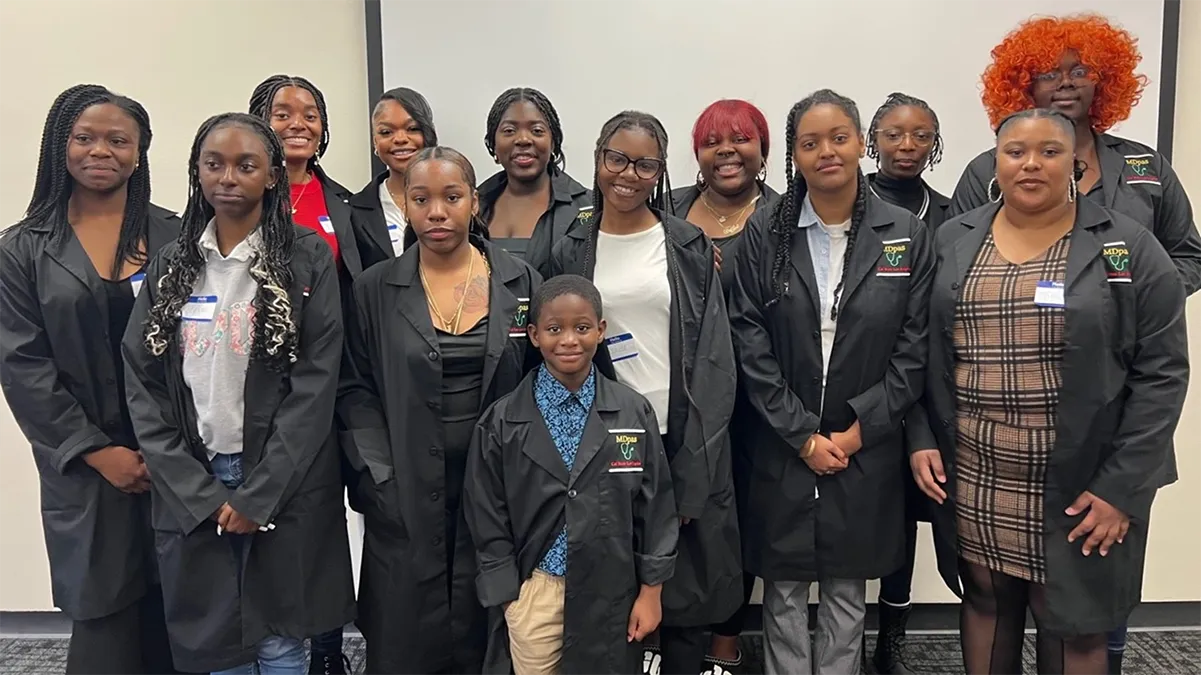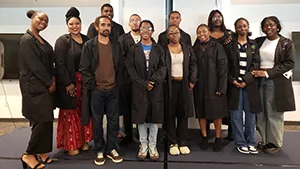Last Updated on February 12, 2025 by Laura Turner
We willingly chose the Black coat to remind us that our approach to medicine and healing and our reasons for selecting our field of study and future practice are fundamentally different than others. For us, the Black represents the infinite being and perpetual unfolding of the ubiquitous Creative Forces of the Universe that dwell in us, therefore, reminding us of our unlimited capacity for retrieving or manifesting healing powers and knowledge. Our Black coats remind us of our history and contribution to the world stage, being the first healers and physicians – we are them, and they are us. Likewise, they remind us of our culture and Indigenous systems and approaches to healing, to which we commit to rediscovering and making the foundation of our practice.” — excerpt from the Black Coat Oath of the MDpas Program written by Dr. Nana Lawson Bush, V
The MDpas program—the vision of Dr. Nana Lawson Bush V, Chair of Pan African Studies (PAS), College of Ethnic Studies, at California State University in Los Angeles (Cal State LA), which evolved into a collaboration with Dr. Okezie I. Aruoma, Professor of Chemistry, College of Natural and Social Sciences — was established in 2022. Dr. Bush, a father of two daughters—one in her first year of medical school and the other in her third year—wanted for his students what he had fostered for his children: a robust foundation and unwavering support for success in the health professions.
The program seeks students who are:
- Committed to academic excellence, community activism, and engagement, and deeply interested in learning about Black history, culture, and Indigenous healing practices;
- Aspiring to pursue careers in the health professions, including medicine (Allopathic MD, Osteopathic DO), dentistry (DMD), pharmacy (PharmD), optometry (OD), veterinary medicine (DVM), chiropractic (DC), occupational therapy (OT), physical therapy (PT), podiatry (DPM), physician assistant (PA), audiology (AuD), and other health-related fields; and
- Cal State LA students, community college students, high school juniors and seniors.
Students in the MDpas program major or minor in PAS while fulfilling the prerequisites for medical and other health-related professional schools. Alongside rigorous academic preparation, the program provides wraparound support to help students excel and gain admission to professional schools. Upon completing the PAS major and required pre-med coursework, eligible students earn the Pre-Medicine/MDpas Certificate, solidifying their readiness for the next steps in their health careers.
The Student Doctor Network interviewed Dr. Bush and Dr. Aruoma for more details about the MDpas program and its emphasis on integrating Pan-African and African-American culture with prehealth courses and experiences.
What are some important historical topics covered in this program?
The MDpas program incorporates topics centered on Black history and culture, emphasizing that African people are the world’s first healers and physicians and the systemic inequities impacting healthcare for marginalized communities. We cover the legacy of the program’s namesake Nana Martin Delany, a prominent 19th-century physician, abolitionist, author, and newspaper editor who was one of the most influential and successful anti-slavery activists of his time. Students also learn about the historical role of African healing traditions, the influence of colonialism on global health disparities, and integrating these traditional practices with modern medicine to promote holistic well-being.
Do students have additional access to learning resources, prehealth advising, mentoring, test preparation (MCAT, DAT, etc.), and clinical exposure/training?
The MDpas program, with the help of its partners, provides robust support through:
- Shadow Experience with Physicians
- Research Opportunities with Professors
- MCAT Preparation
- Personal Statement and Application Review
- Cohort Model for Peer-to-Peer Support
- Guest Speakers
- Possible Education Abroad Opportunities in Africa
- Black Coat Ceremony and Orientation
- Possible Matriculation Agreements with Medical Schools
- Council of Elders Guidance
Two of our partners include Maite Villarreal Rodriguez, Director of the Office of Diversity and Inclusion at KECK USC School of Medicine, who provides mentoring and service opportunities for MDpas students, and Dr. Dotun Ogunyemi, MD, of The DOF Pathway Program, which offers MDpas students MCAT preparation, shadowing opportunities, involvement in scholarly activities and productivity, and mentoring.
How successful have your students been with acceptance to medical school? Other health professions programs (dentistry, veterinary medicine, optometry, etc.)?
Although the program is young, it has laid a strong foundation to support student success. The first cohort of MDpas students will apply to medical and other health professions programs in 2025. Through linkage agreements, five of our students will apply to various programs at Western University of the Health Sciences. With dedicated mentorship, academic preparation, and application assistance, the program anticipates strong outcomes across various fields, including medicine, veterinary medicine, physical therapy, pharmacy, and more.
Does your program have unique study-abroad opportunities?
With future funding, MDpas envisions study-abroad opportunities in Africa, where students will learn traditional medicine and explore indigenous healing practices. These experiences aim to connect students with their cultural heritage and provide unique perspectives on global health care.
What research opportunities are available to students?
Students can access collaborative research projects with professors in PAS, biology, and chemistry. They have presented papers at the National Council of Black Studies and can publish their work in the PAS student journal. Additionally, students can participate in research projects through our partners and other summer programs.
Research topics often focus on health disparities, cultural medicine, and advocacy for equitable healthcare practices. These opportunities encourage students to develop scholarly expertise alongside clinical knowledge.
Have your students organized community outreach or advocacy programs outside of their classes?
We have one scheduled through our partner Keck Hospital of USC.
If students don’t want to be healthcare professionals, what other options are available (based on previous students you have had)?
Students who decide not to pursue careers in the health field remain part of the MDpas program if they desire. For example, we have a student who wants to be a psychologist rather than a psychiatrist. We are supporting his pursuit of a graduate program in psychology while still grounding his approach in a Pan-African paradigm.
What are common attributes or characteristics among the more successful MDpas students/alumni?
Successful MDpas students typically exhibit:
- A commitment to academic and professional excellence.
- Leadership qualities in community activism and service.
- A strong connection to their cultural roots and Pan-African values.
- Resilience and adaptability in overcoming challenges.
- Collaborative spirit and peer support within their cohorts.
How do you measure the specific impact your program has had? What are your concerns about the future of this program? Are there future opportunities you are excited about?
The program measures impact through student outcomes, such as successful admissions to health profession schools and the ability for students to approach their work from a Pan-African perspective. Challenges include more institutional and financial support to expand the program’s reach. Exciting future opportunities include scaling study-abroad initiatives, securing additional matriculation agreements with medical schools, and enhancing resources for student success. MDpas remains dedicated to producing culturally competent and equipped health professionals to address global health disparities.




